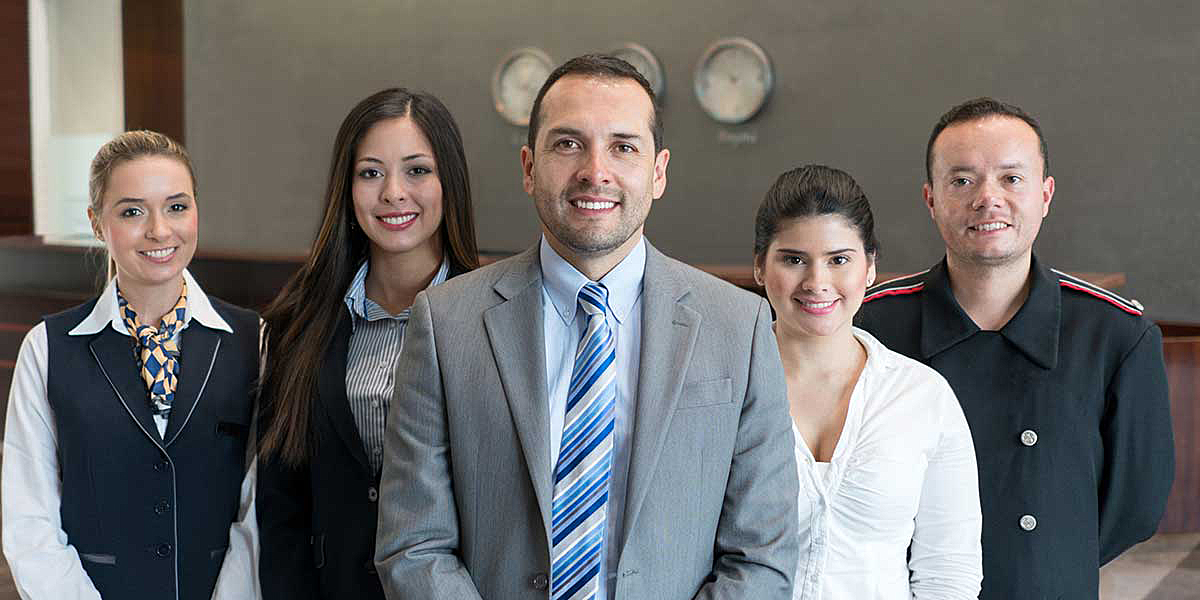Working in the hospitality and tourism industry is attractive to many aspiring business professionals. When you're working in hospitality, you can apply your knowledge in business fundamentals while providing memorable experiences to travelers and vacationers.
If you're considering a career in hospitality and tourism, you'll want to know what traits and skills are prioritized by hiring managers and employers. Before you begin your job search, consider these seven key skills to being successful in the hospitality industry.
1. Communication and Interpersonal Skills
In hospitality and tourism, communication is paramount. Listening to customers’ wants, needs, desires, and concerns and being able to communicate back that you understand are important for anyone in public-facing roles.
Effective hospitality professionals reassure their customers that they can help them with their needs or find solutions to their unique situations. Even if you don't have an immediate solution or answer, letting customers know that you understand the importance of their issues and you’re working toward a positive outcome can go a long way in keeping them happy.
2. Organization Skills
Depending on your hospitality career choice, your responsibilities may include managing a team, working on financials, ordering supplies, scheduling workers, and more. Being organized is crucial for a job in the industry. Keeping exact records of transactions, time schedules, inventory and more will help you exceed customer expectations.
3. Customer Service Skills
When working in hospitality, you must have superb customer service skills. You'll need to listen, diffuse emerging conflicts, and manage a multitude of tasks in a polite and gracious manner. Customer service skills encompass a wide range, including showing empathy for others, letting them know you're working on resolving any issues they experience, and most importantly, demonstrating patience with your customers.
4. Working With a Team
Working in hospitality and tourism often means working as a part of a team. Whether you're a manager, supervisor, or host at a restaurant, you’ll need to cooperate with others. Teamwork includes the ability to delegate tasks, step in when needed, and take instructions from superiors to make sure your operations flow smoothly. Productive team members work together in a supportive manner to achieve a positive outcome for customers.
5. Formal Training and Education
Many employers prefer to hire candidates who have formal training, education, and a degree in hospitality and tourism. Earning a degree at an accredited university with a robust business program – preferably with concentrations in hospitality and tourism – will help you get noticed by hiring managers in the industry.
6. Technology Skills
Computer and technology skills are required for many kinds of positions in the hospital and tourism. For example, many businesses use a point-of-sale system to complete transactions or accept payments from customers. Additionally, marketing is important for any tourism business, and many forms of marketing – from advertising to public relations, social media and more – require various kinds of technology.
7. Cultural Awareness and Sensitivity
In the world of hospitality and tourism, you'll often encounter people from around the world who have varying cultural views. It’s important to keep an open mind and be aware of cultural nuances that make your guests or customers feel comfortable. It’s impossible to be aware of every cultural preference of the customers you meet, but making an effort will make a difference.
Conclusion
One of the keys to being successful in your dream job is by building your skills through education. Here at Columbia Southern University, our online bachelor’s degree in business with a concentration in hospitality and tourism helps students develop the essential communication, interpersonal, and technical skills that can help anyone advance in the industry.
To learn more about all our online business degree options, visit our website.
Multiple factors, including prior experience, geography and degree field, affect career outcomes. CSU does not guarantee a job, promotion, salary increase, eligibility for a position, or other career growth.
Columbia Southern University is accredited by the Southern Association of Colleges and Schools Commission on Colleges (SACSCOC) to award associate, baccalaureate, masters, and doctorate degrees and certificates. Questions about the accreditation of Columbia Southern University may be directed in writing to the Southern Association of Colleges and Schools Commission on Colleges at 1866 Southern Lane, Decatur, GA 30033-4097, by calling (404) 679-4500, or by using information available on SACSCOC’s website (www.sacscoc.org).





